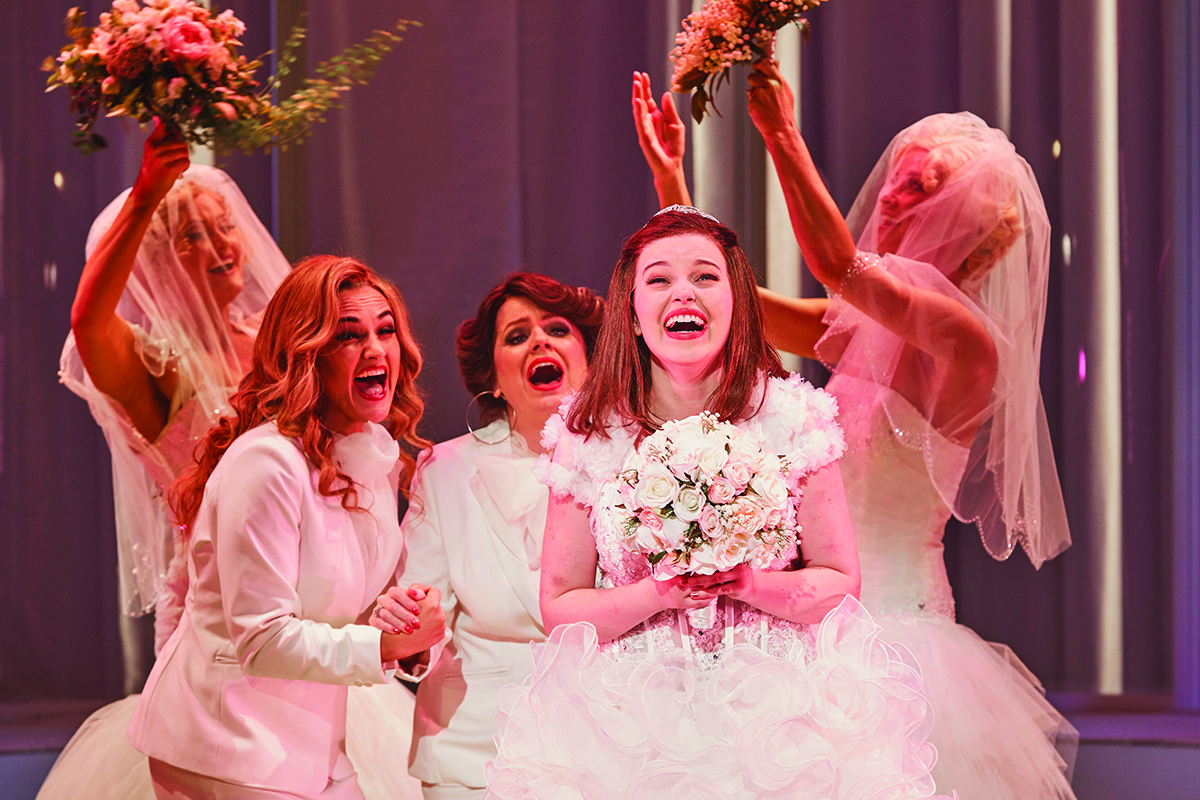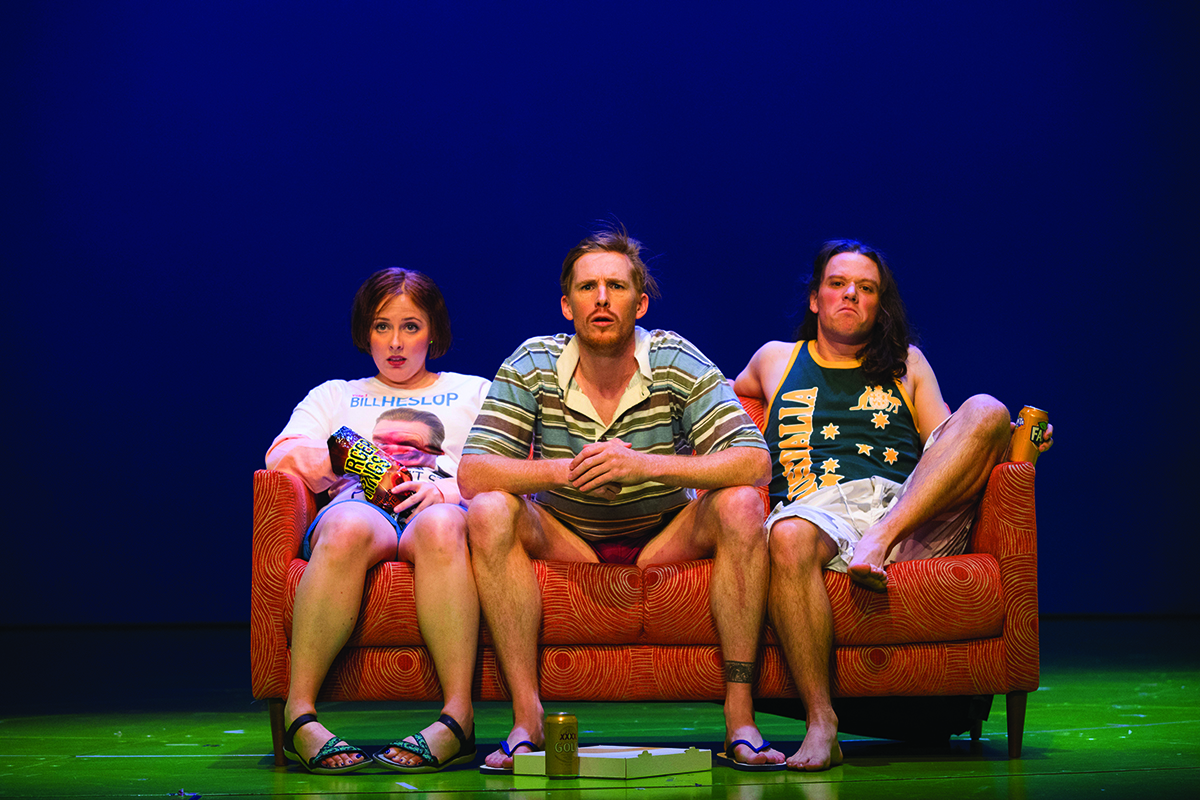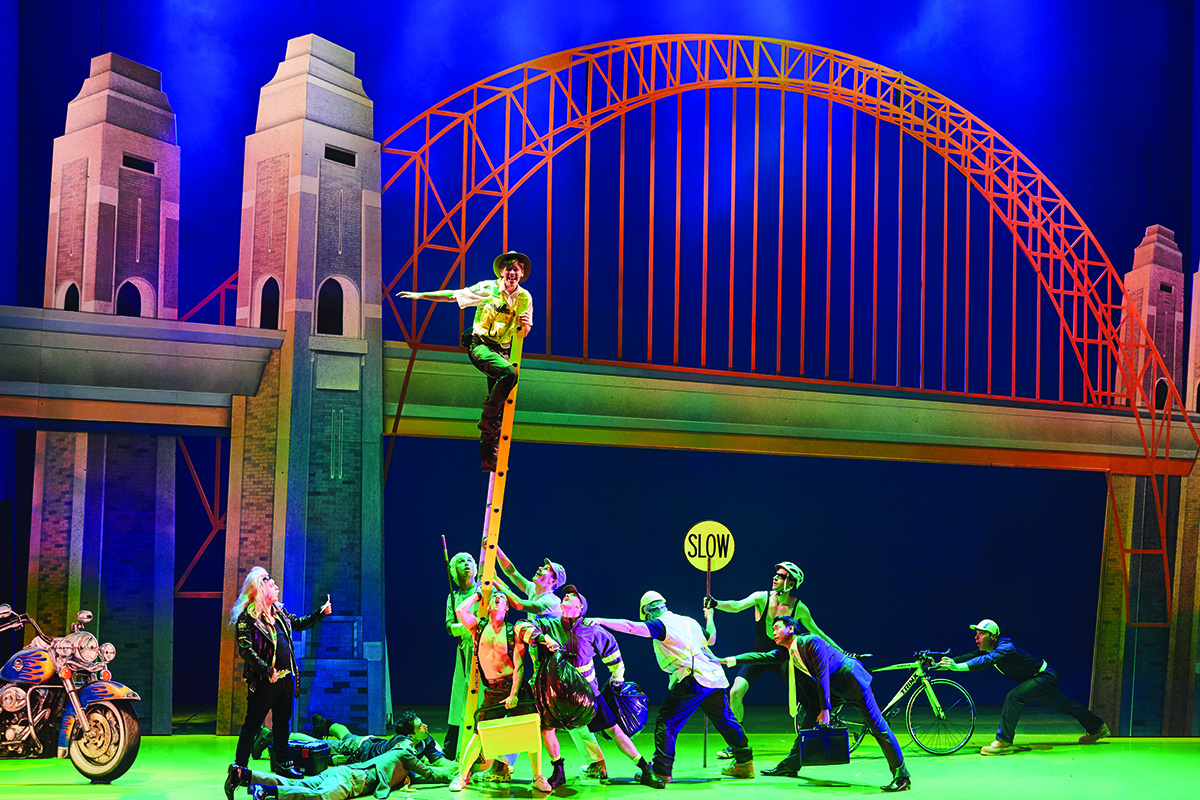
Muriel’s Wedding, The Musical: Excess, good and bad
Spoiler alert: this review includes key plot details from writer PJ Hogan’s adaptation of his screenplay for the film Muriel’s Wedding (1994) for Sydney Theatre Company’s Muriel’s Wedding, The Musical.
Friday night, 17 Nov: Muriel’s Wedding, the film
Watching PJ Hogan’s Muriel’s Wedding for the second time in two decades, I’m impressed, moreso than on first viewing. I recall my surprise at how grim it was, funny but painfully frank about parental psychological abuse, peer group bullying, compensatory escapism (via wedding fantasies and the music of ABBA), political corruption, sexism, suicide and a devastating brain tumour. On second viewing the film was as bleakly funny as ever, but revealed itself to be far better scripted, shot and acted than I remembered. Not only did it face full-on the issues it confronted, but was largely and very effectively unsentimental. The moment when Muriel announces that she’s taking her wheelchair-bound erstwhile best friend Rhonda with her back to Sydney, is near-teary but brisk and funny and deftly counterpointed with the tense scene between Muriel and her unrepentant father in which she firmly rejects pressure to take on responsibility for her emotionally damaged siblings. Muriel might not be bright, but she’s a far better person than she ever thought, and now she’s wise, leaving behind the self-obsession into which her tyrannical father and helplessly complicit mother had driven her and committing to caring female friendship.

Briallen Clarke, Michael Whalley and Connor Sweeney in Sydney Theatre Company and Global Creatures Production of Muriel’s Wedding the Musical, photo © Lisa Tomasetti
Saturday night, 18 Nov: Muriel’s Wedding, The Musical
Attending the red-carpeted opening night of Muriel’s Wedding, The Musical, I’m apprehensive. How much of the film’s spirit, especially as embodied in the screenplay — adapted from his screenplay by Hogan and with lyrics by the musical’s composers Kate Miller-Heidke and Keir Nuttall — would be retained? I needn’t have worried. And, would the film’s incisively drawn principal characters be reduced to all singing and dancing sketches? They weren’t. Muriel and Rhonda, though more broadly characterised than their film counterparts, are convincingly realised.
Muriel Heslop, a most unlikely lead character, is Hogan’s genius touch. A slow thinker, often unaware of her impact on others, Muriel is slow to pick up on insult and rejection and all too easily slips into her fantasy world. Maggie McKenna acquits herself in the role admirably with a toothy goofiness and a slack-lipped, innocent stare, extra-rounded vowels and vocal register lower than her sharply articulated singing — a quite different voice. Madeleine Jones’ quick-witted, sexy Rhonda perfectly and compassionately counterpoints Muriel, while her descent into pain and bitterness is keenly conveyed. The pair’s soaring, nigh operatic duet, “A true friend,” is a passionate expression of friendship.
I had wondered if the musical would underplay the darkest dimension of the film — the suicide of Muriel’s mother, Betty. It didn’t in one way, but did in another, which I’ll return to. Justine Clarke’s sensitive portrayal of the woman as an emotionally befuddled, physically disoriented, lost soul is acutely felt, if modified by new additions to Hogan’s narrative. Gary Sweet as Muriel’s father is more ebullient than Bill Hunter’s sinister original, a bigger performer on the business stage and given his own number with an enormous regional development maquette to romp about on. A re-write of the screenplay’s final scenes unfortunately undercuts any opportunity for Sweet to deepen his characterisation; I’ll come back to this too.
Sizeably enlarged is the role of Muriel’s Sydney boyfriend Brice (Ben Bennett), transformed into an embattled parking inspector and a more likely romantic prospect for her affections than in the film, if still a tad defeated by life, as expressed in a witty take on “pessimism, the ointment for the rash of disappointment” in the song “Never stick your neck out,” performed with the male cast. The other key character in the narrative, an Olympic swimmer, Alexander (Stephen Madsen) looking for marriage with which to gain Australian citizenship, is this time not South African but more aptly Russian and given a new dimension, very much of the moment. Other characters, like Muriel’s cruel peers, remain outright satirical creations granted additional force through superbly harmonised singing and frantic team dancing, while her siblings, Joanie (Briallen Clarke) and especially the slightly deranged Perry (Michael Whalley), are immediately familiar variations on the originals and truly memorable, the audience erupting with laughter and applause the first time Joanie utters, “You’re terrible, Muriel.”

Cast of Sydney Theatre Company and Global Creatures Production of Muriel’s Wedding the Musical photo © Lisa Tomasetti
Good excess
In the film, Muriel’s escapism is restricted to taking refuge in the music of ABBA, holidaying with stolen money, running away to Sydney and visiting bridal shops; in the musical it’s given fantastical dimensions, the most deftly realised of which has been to turn ABBA, who astonishingly pop out of Muriel’s wardrobe, into a glitteringly costumed, supportive chorus who ultimately attempt to keep the immature Muriel all to themselves. When she goes serial shopping for wedding dresses, Muriel’s fantasising is fast running out of control, her neglect of the crippled Rhonda irresponsible. The stage, in the manner of Hollywood musicals of especially MGM in the 1940s and 50s, swells with parading models and swathes of cascading soft curtains washed in pastel lighting, with Muriel as the glorious bride, adored by ABBA.
It’s not just Muriel’s fantasies that are writ large, the whole world is, whether a Chinese restaurant evoked simply with an arc of huge red lanterns or Sydney with a stage-filling Harbour Bridge and, seen beneath, the Opera House which later, courtesy of the revolving stage, arrives before us, revealed to be of human scale and great to loll about on. Muriel’s meeting with Alexander is akin to an Esther Williams’ (MGM again) swimming pool sequence, the dancers on their backs semi-circled across the stage, miming water ballet kicks.
The power of musical theatre and of opera resides in a shared acceptance of distortions of scale — amplification of character, place, sound, movement and everyday behaviour — with roots in ritual and a search for transcendence. In Muriel’s Wedding, The Musical we are implicated far more heavily in Muriel’s fantasising than in the film — the escapism is ours as much as hers with scene after scene of engrossing invention and spectacle. But, for all the excess, the musical feels emotionally true to Hogan’s original vision, with Kate Miller-Heidke and Keir Nuttall’s dramatic fusion of contemporary pop with the idiom of the musical (more Lloyd Webber than Sondheim) providing rich counterpoint to the sheer pop pull of the ABBA songs.

Helen Dallimore, Maggie McKenna, Gary Sweet, Adrian Li Donni and cast in Sydney Theatre Company and Global Creatures Production of Muriel’s Wedding the Musical, photo © Lisa Tomasetti
Bad excess
There is however, a point when excess turns bad. The first sign is the disdainful Alexander finally having sex with Muriel (as in the original some kind of limited affection grows between the two, and even there it felt odd); but then reveals he’s gay. Then Hogan’s script and the composers let rip with Betty’s funeral, at which Muriel heroically makes public her father’s sins, rendering him supine and abandoned by his girlfriend and associates. An apparition of a now happy Betty appears, professing, out of the blue, her own love for ABBA, effectively uniting her with her daughter. Muriel breaks into an adoring eulogy, the mawkish “My Mother,” in which Betty’s maternal support and love is applauded. As in the film, and the musical up to this point, unconditional love has not been evident — it’s Betty’s tragedy that she has always capitulated to Bill, never defending Muriel.
As if this sentimental overload isn’t enough, at the very moment that the bond between Muriel and Rhonda is restored, a triumph for female friendship, Muriel is reunited with erstwhile boyfriend Brice — to what end, Muriel’s wedding? Hogan and his lyricists’ additions do pass by in a tumult of high drama, song and dance, but on the morning after I wake to that queazy feeling of a sugar overdose.
Muriel’s Wedding, The Musical was in many ways a special experience, expertly directed by Simon Phillips, deftly choreographed by Andrew Hallsworth, with excellent musical direction and arrangements by Isaac Hayward and endlessly witty inventive set and costume design by Gabriela Tylesova. The play between ABBA songs and new ones validated the update of Muriel’s Wedding to the present alongside a plot strand in which Muriel becomes a short-lived social media sensation (shutting down her fantasies she simultaneously closes her account). The story of the redemption of a psychologically damaged outsider rings as true in the musical as in the film, but an unwarranted turn to high melodrama and blatant sentimentality, the excesses common to the form, made for a magnificent but imperfect musical.
–
Sydney Theatre Company, Muriel’s Wedding, The Musical, Roslyn Packer Theatre, Sydney, 8 Nov-27 Jan
Top image credit: Sheridan Harbridge, Helen Dallimore and Maggie McKenna in Sydney Theatre Company and Global Creatures Production of Muriel’s Wedding the Musical, photo © Lisa Tomasetti






